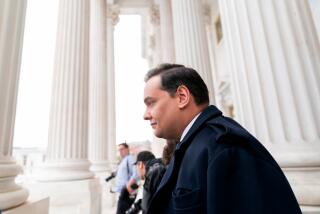BOOK REVIEW : Classic Pitchman Is Tossed a Modern Psychological Lesson : THE VERY AIR <i> by Douglas Bauer</i> ; Morrow; $20, 378 pages
- Share via
“The Very Air” is like a replica of a 19th-Century clipper ship with a diesel engine inside. Sailors sing chanteys, scurry up the rigging and make the sails billow convincingly, but at certain moments of calm, when the sails hang slack but the ship continues to forge ahead, we realize that its motive power is thoroughly modern.
Douglas Bauer’s second novel (following “Dexterity”) is a seemingly old-fashioned “good read,” full of period detail, robust characters and a picaresque flow of adventures. The hero, Luther Mathias, is a classic American type: the con man, the huckster, the charlatan who half-believes his own cynical pitch.
We meet Luther in 1905, on a farm in the Texas Panhandle. He is 10 years old, bright and sensitive. His mother has died; his father has abandoned him in all but name. But the uncle and aunt who adopt Luther are kind.
True, Ray and his wife, June, run a traveling medicine show, selling snake oil to “rubes” and “yokels,” but Luther enjoys performing, and his uncle’s lies can be rationalized away: The medicine is harmless.
Then June dies, and Ray, in his grief, drives Luther away. This scene fails to convince us--Ray has been too nice a man--and although it’s Bauer’s only mistake, it hurts the novel because it’s a scene Luther recalls over and over as proof that people will always die or desert him, that only a rube would trust anyone besides himself. More credibly, Ray’s philosophy remains with Luther even after he strikes out on his own. Its chief tenets: 1. Stick to imaginative cures and avoid practicing real, physical medicine. 2. Don’t do anything illegal.
Luther first poses as a “male specialist” treating venereal disease. Then, in the 1920s and ‘30s, he finds his true calling: spouting Bible homilies and peddling monkey-gland rejuvenation surgery over the radio.
True to rule No. 1, the surgery is barely a scratch and no monkey glands are used. True to rule No. 2, he broadcasts from a powerful station just over the Mexican border from Del Rio, Tex., out of reach of federal authorities.
The station is secretly financed by Haskell Albright, the novel’s fictitious owner of the Los Angeles Times.
Luther meets him through Billy Boswell, a silent-film star who comes to Del Rio to retrieve his wife, Alyce Rae, who has wandered there in a state of amnesia. Luther falls in love with Alyce.
A few years later, Luther’s position seems impregnable. He has vanished into his radio persona: “He would never fully believe in what he said. But he had come to believe utterly in himself.”
Here we pause to marvel at Bauer’s research. The events and people in “The Very Air” aren’t real, but they seem steeped in reality. Albright isn’t Harry Chandler, but what a salty rascal Bauer has made of him. The lore of medicine shows, the movies, the monkey-gland craze, the Depression and cross-border radio is woven into the fiction. Luther’s sales pitches would succeed even today.
Then we notice that the reason we paused is that the wind has gone out of the novel’s sails. At some point, we stopped sympathizing with Luther and began to root for his downfall. But how will it happen?
Trouble is brewing in several quarters. Billy is losing his mind; the new Cardenas Administration in Mexico is unbribable; Albright is even shrewder and more ruthless than Luther is. But no moral crisis is looming--and Bauer, by his use of such period storytelling devices as an omniscient narrator, has led us to expect one.
In fact, these devices work the opposite way: They lend the story a comic detachment, a pitchman’s glibness, and keep us from identifying with Luther’s victims.
Yet the novel keeps on moving, because Bauer’s main interest isn’t moral but psychological. Having explored the reasons for the pitchman’s timeless appeal, he shows how Luther, whose whole life is a defense mechanism, falls apart when he reaches out to Alyce, trusts another person again, becomes a rube. Although Luther never faces his own hypocrisy, we regret, much as his radio audience does, having such a spellbinder go off the air.
More to Read
Sign up for our Book Club newsletter
Get the latest news, events and more from the Los Angeles Times Book Club, and help us get L.A. reading and talking.
You may occasionally receive promotional content from the Los Angeles Times.










